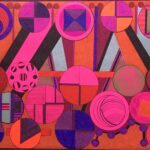Why is it difficult to smile and make eye contact with a stranger? Does a culture filter out people because of fear? We pass by many people in our morning and evening walks on the oceanfront Melancon. Frankly, the young children look at us the most. They are open and curious…no fears.
It is most comfortable to stay among our tribe. Consider that, in doing so, we may miss some of life’s most joyous experiences and opportunities. The diversity of our planet is a gift to be grateful for. Sameness in race, culture, religion, and economics, keep us confined to using only a tiny percentage of our brain and our potential. When we stay totally in our comfort zone I believe it is less likely we develop a higher level of compassion, patience, tolerance, humility, and forgiveness. Where does courage come in?
Physical courage is the most conspicuous. Mountain climbers, deep-sea divers, beach lifeguards and soldiers exhibit bravery and boldness.
I am curious, however, to better understand courage from a deeper level of meaning. Who is courageous? Why is it hard to define?
Let’s accept that a person’s actions may demonstrate good or bad courage. What are the different types of courage we experience or personally exhibit? I wondered if I was a courageous person?
Aristotle described courage as “the first virtue as it leads to all other virtues.” Oprah Winfrey said, “You get in life what you have the courage to ask for.”
I have been operating in the head during a teaching career, then in business, and in personal relationships. So I first wanted to know what science had to say. The mental neurology of physical courage involves a contrast between our ancient reptilian brain (the amygdala), and our anterior cortex. The former brain portion drives fear, fight, or flee. The latter reduces our fear-based responses.
Most research points to our heart and the desire to overcome our fears when defining courageous. Feeling more courageous, however, has to come from within. We can learn to enhance our courage. There are lots of opportunities to practice. What other kinds of courage do we face?
I kept the types of courage to six I felt are most prevalent in our daily lives. Interestingly, the number six in numerology aligns with having a loving and caring nature. It’s mathematically a perfect number (we’ll explore the wonders of numerology in a future article). Here is my list, and they not in order of importance:
* Physical
* Social
* Moral
*Spiritual
*Empathetic
* Creative
In simplest terms, physical courage is taking an initiative, an action to produce a desired outcome. We experience this through helping a person, protecting someone or overcoming fear in mountain climbing and skydiving. Such courage may be spontaneous or planned. Mark Twain remarked, “It is curious that physical courage should be so common in the world and moral courage so rare”.
Social courage requires our true self to emerge. When we take a stand without fear of rebuttal or criticism we demonstrate this. We accept there is risk of negative reaction, but speak our truth, and understand there maybe consequences. Anne Frank wrote in her diary, “I know what I want, I have a goal, an opinion, I have a religion and love. I know that I’m a woman, with inward strength and plenty of courage”.
Moral courage embodies taking action after thought, not reacting impulsively. While media use exploitive headlines to promote a story or sell a commercial product, our emotional intelligence knows this is the absence of courage. We are encouraged when celebrities express their outrage at injustice, and discouraged when leaders forget they are supposed to be representing their community.
Spiritual courage leads us down different paths, beliefs, culturally, and geographically. Spiritual courage is within everyone. We know so little about the mysteries of our universe and frequently wonder, what is our mission in life? Courage is when we remain open to things we don’t understand. Accepting death and taxes overcomes some fears. We may, however, also look to a higher power to find inner peace. “Asking why” to challenging questions opens up our hearts. That takes spiritual courage. I really like Frida Kahlo’s words, “I never paint dreams or nightmares. I paint my own reality.”
Empathetic courage seems clear. Courage is action. Some will seek help while others will initiate their caring and concern. This courage demonstrates a heart connection. In the Wizard of Oz, the lion isn’t bold enough to be the King of the Beasts. He opens up to the Wizard who has him drink a strange potion, saying it is courageous to drink this. The message is obvious…don’t wallow in your fear Sir Lion. Of course the Tin Manwanted a heart, not a gold medal, as a symbol of courage. But it takes action to move forward. Even the acceptance to rely on others for help or advice takes courage. Poco y poco may be our most valuable counsel to feeling more deeply for others.
Finally, creativity and courage are strongly aligned. All humans are creative. We may love cooking, gardening, or painting. Some less obvious creative activities are reading, journaling, sewing, and dancing. All involve thinking, imagination, and an element of bravery, as the outcome of these activities is unknown. When we apply creative courage we are overcoming fear and strengthening our self-esteem. Vallarta has many new creative doors to open. Take advantage of this opportunity to experiment, play and learn new skills.
As courage is in the heart, Taoism founder Lao Tzu’s words hit the mark, “Being deeply loved by someone gives you strength, while loving someone deeply gives you courage.”



